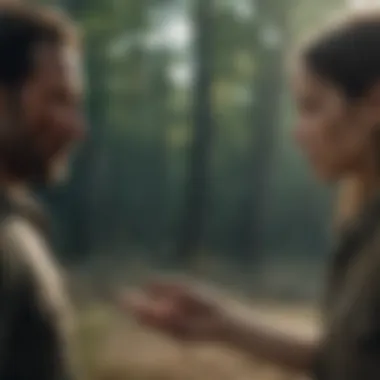The Final Season of The Walking Dead: A Detailed Review


Intro
The final season of The Walking Dead serves not just as an end to a long-standing saga, but as a mosaic of character journeys, moral dilemmas, and societal reflections. This installment brings together threads that have been meticulously woven since the show first graced our screens over a decade ago. Its culmination provides keen insights into the changing landscape of television storytelling, especially within the post-apocalyptic genre.
In these last episodes, familiar faces and new characters collide within a world ravaged by both undead and human threats. As viewers, we are invited to reflect on the choices made by the characters we’ve come to know and love—or love to hate. Each moment is imbued with the weight of history, echoing the show’s themes of survival, hope, and humanity's darkest impulses.
Exploring this final season, we’ll dissect how the dynamics of power shift, scrutinize key relationships, and answer pivotal questions: Who emerges as a leader in the chaos? How do our protagonists confront their pasts? And most importantly, what does the conclusion signify for the broader narrative?
As the show wraps up, it is crucial to not only appreciate the narrative arcs that have concluded but also to examine the larger cultural implications. After all, The Walking Dead has left an indelible mark on pop culture, resonating beyond the screen into the realms of comics, conventions, and digital discussions. Let's embark on this journey to analyze the intricate layers of the final season, contemplating its impact on both the audience and the genre itself.
Prolusion to the Final Season
The final season of The Walking Dead signifies not just the closing of a chapter for the series, but an opportunity to reflect on its expansive journey. Understanding its intricacies allows fans to appreciate the various narratives that have unfolded throughout the years. In this section, we will discuss the importance of examining this concluding season, as it encapsulates themes of survival, the complexity of human relationships, and moral dilemmas faced by its diverse characters.
This season, especially, puts a spotlight on the culmination of numerous plot threads that viewers have followed passionately. Fans have invested considerable time and emotion into these characters, making their journeys pivotal to the show's legacy. An analysis of this season offers insights into how the creators chose to wrap up these arcs while introducing new challenges that resonate with the audience.
Overview of The Walking Dead
The Walking Dead has become a cornerstone in the television landscape since its debut in 2010. It has brought to life the struggles of humanity in a world overrun by the undead while exploring deeper issues, such as loss, hope, and what it means to be truly alive—even when surrounded by death. The series captures the transformation of characters like Rick Grimes, from a lawman to a leader wrestling with impossible choices, highlighting the evolving nature of hope and despair.
As we stand on the precipice of the series' final season, it’s essential to recognize that this isn't merely a tale of survival horror. At its core, The Walking Dead examines the fragility of human connections amidst chaos. The show’s creators brilliantly thread together the interactions of diverse personalities, weaving their stories into a complex tapestry that speaks to the human experience.
Significance of the Final Season
The final season holds tremendous significance as it serves as a resolution not only for the characters but also for its dedicated viewership. Each episode offers a sense of closure while forcing the audience to confront the realities of loss and sacrifice. Characters who once appeared invincible find their limits tested, leading to potentially devastating outcomes that keep viewers on the edge of their seats.
"In this brutal world, every choice has a cost—sometimes too high to bear."
For many fans, the final season becomes a bittersweet experience. The promise of long-awaited character arcs reaching their climax mingles with the dread of saying goodbye to beloved figures. More than just a narrative conclusion, it reflects the cumulative impact The Walking Dead has had on modern pop culture, elevating it beyond mere entertainment.
Examining the significance of this season allows us to grasp how the series shaped and responded to societal shifts, capturing fears, hopes, and the essence of what it means to endure. This in-depth analysis seeks to illuminate the many layers inherent in the final season, ensuring that the legacies of both the characters and the series endure long after the credits roll.
Narrative Structure and Themes
The narrative structure and themes of a story hold the power to drive emotional engagement and enhance the viewer's overall experience. In the final season of The Walking Dead, these elements come to a head, weaving together strands from previous seasons while pushing the narrative towards a fulfilling conclusion. The choices made in developing these themes are significant, as they not only reflect the individual character arcs but also address broader questions about society and the human experience in the face of overwhelming adversity.
Thematic Evolution Over Seasons
Survival and Morality
Survival is more than just a central motif in The Walking Dead; it serves as a lens through which morality is examined and sometimes skewered. As characters navigate the landscape of a post-apocalyptic world, their choices often put them in moral quandaries that challenge their ethics and principles. In this season, the exploration of survival sharpens its focus on the lengths individuals will go to protect their loved ones, even if it means compromising their moral code.
- The relentless pursuit for survival adds a layer of intensity to the narrative, showcasing the desperation that swells within each character. It becomes not only about staying alive but questioning the essence of being human amidst chaos.
- A unique feature of this thematic evolution is its ability to evoke anxiety in the audience as they witness the characters struggle with their choices.


However, this exploration isn't without complications. The constant conflict between survival and morality creates a discomfort that might linger with the audience, especially when faced with shocking decisions made by beloved characters.
The Nature of Humanity
Closely tied to the concept of survival is the thematic exploration of the nature of humanity, which is intricately woven throughout the concluding season. It raises pivotal questions: What does it truly mean to be human in the face of such devastation? Are the survivors more than just shell of their former selves?
- This theme highlights the duality of human nature, showing both the capacity for good and the potential for violence. The characters' journeys often reveal the tension between their past lives and their current conditions.
- A distinguishing feature of this exploration is how it unfolds through interactions, where the remnants of former relationships provide a backdrop against which the stark shifts in their personalities become apparent.
Such profound questions serve as catalysts for the audience's reflections about their own humanity, prompting a reconsideration of values and what matters most when stripped to the core. The challenge lies in how clashing perspectives shape the narrative, sometimes offering a clear path and at other times presenting moral ambiguities.
Key Plot Arcs
Resolution of Long-Standing Conflicts
In this final season, the resolution of long-standing conflicts comes to the forefront, delivering closure to complex rivalries that have permeated the series. This resolution becomes essential not only for character development but also for the narrative's integrity.
- The weaving together of past grievances allows viewers to witness the evolution of relationships, reinforcing the idea that time and circumstances can change one's perspective.
- Its key characteristic is the sensitivity with which these resolutions are approached. The writers show restraint and care, allowing moments to breathe and resonate.
Yet, as satisfying as these resolutions may be, they also bring about an irony. While conflicts are settled, the repercussions still left lingering can be just as impactful, reminding the audience that even closure can carry its own weight.
New Threats Emergence
Even as some conflicts find resolution, new threats emerge, invigorating the narrative with fresh tension and uncertainty. This aspect contributes significantly to the overarching theme of survival, instilling a sense that the fight isn't over.
- The introduction of new threats emphasizes the relentless nature of the world depicted in the series. It underscores the idea that just when one thinks they've found peace, the ground beneath them can shift dramatically.
- A fascinating feature of these new threats is how they reflect the internal struggles of the characters, mirroring their fears and hopes.
However, the challenge with this approach lies in maintaining balance. By introducing new dangers, there’s a risk of overwhelming the audience or detracting from the emotional beats of character arcs that have been years in the making. Finding harmony among these elements is paramount for delivering a cohesive narrative experience.
Character Development
Character development plays a pivotal role in The Walking Dead, especially in its final season. This evolution of characters doesn't just shape individual arcs; it also profoundly impacts the collective experience of the viewers. Through the journeys of each character, we see reflections of our own humanity, and this exploration of personal growth and moral dilemmas enhances the narrative depth of the series. The audience gets to engage with characters on a level that goes beyond their fight for survival. Instead, it tests their ethics, builds tension, and allows for compelling storytelling that resonates on different fronts.
Analysis of Protagonists
Rick Grimes' Journey
Rick Grimes' journey culminates in the final season with an intense focus on his transformative path since the onset of the apocalypse. A specific aspect worthy of analysis here is Rick's confrontation with leadership and the burdens it carries. His evolution from a lawman trying to maintain order to a war-weary leader reflects a broader commentary on power and morality. What stands out about Rick is his unwavering sense of duty, a trait that serves as both his greatest strength and his most significant vulnerability.
This aspect of Rick's character contributes to the overall theme of leadership amidst chaos. By displaying the complexities of his gratitude and remorse throughout the season, viewers can connect with his internal struggles. The unique feature of his journey is how it embodies the fine line between survival instinct and moral compromise. One advantage of this portrayal is that it garners empathy from the audience, making Rick's decisions feel tangible and profound. However, this also comes with disadvantages, as some viewers may find Rick’s journey frustrating, as his decisions oscillate between desperation and hope.
Michonne's Growth
Turning our lens on Michonne, her growth is marked by a search for community and stability amid relentless turmoil. A significant aspect of Michonne's progression is her transition from a lone wolf to a pivotal member of her community. Her development throughout the series speaks to the importance of connection, as her character exemplifies the healing power of relationships forged during dire circumstances.
A key characteristic that shines through Michonne is her resilience, a trait that has turned her into a role model for many fans. This resiliency is not just physically manifesting but also highlights her emotional strength in navigating loss and trauma. The unique feature of her journey lies in her ability to find empowerment in vulnerability—something many viewers can relate to, particularly in the context of modern-day dilemmas.


However, her arc does come with drawbacks; some interactions may feel rushed, limiting the depth of certain relationships. But ultimately, her drive toward growth and belonging serves as an inspiring testament to the human spirit.
Supporting Characters' Arcs
Daryl Dixon's Complexity
Daryl Dixon stands as one of the most complex characters in The Walking Dead, showcasing profound growth throughout the series. A focused area for this analysis is Daryl's evolution from an outsider to a reliable protector and leader within his group. Daryl’s journey reflects themes of redemption and acceptance.
What makes Daryl particularly intriguing is his deep-seated vulnerability, often masked by his tough exterior. This juxtaposition is a beneficial aspect for this article, as it promotes discussions on emotional exploration and resilience, core elements in the human experience. Daryl’s unique feature lies in his backstory—his transformation is rooted in painful past experiences that shape his motivations.
One advantage of Daryl’s character development is his relatable struggle with loyalty and identity, which resonates with many viewers. However, an occasional drawback is that some fans might perceive his arc as somewhat stagnant, given that he sometimes appears as a reactionary character in the face of overwhelming circumstances.
Carol Peletier's Transformation
Carol Peletier's transformation is emblematic of profound and sometimes heart-wrenching evolution. A specific focus here is her shift from a timid housewife to a formidable fighter and strategist. Carol embodies growth through suffering, as her character arc is steeped in a multitude of losses that ultimately refine her resilience.
The key characteristic of Carol's revolution is her willingness to adapt to survival's harsh realities. This trait positions her as a strong female character, resonating well with audiences looking for depth in representation. Her unique feature—an unwavering sense of morality juxtaposed with tough choices to protect her loved ones—has significant implications in the series.
While her development is compelling, it does not come without challenges. Some viewers may argue that her choices seem to oscillate without steady growth, leading to frustrations regarding her ultimate direction. Yet, Carol's journey remains a testament to the complexities of trauma and empowerment during trying times.
Cinematography and Direction
Cinematography and direction play crucial roles in shaping the atmosphere and overall impact of a series like The Walking Dead. As the final season unfurls, these elements become paramount in conveying the deep emotional undertones of the story and the harrowing conditions the characters navigate. The choice of camera angles, lighting, and framing, combined with the director's vision, can evoke powerful feelings in the audience, encouraging them to connect with the material on a more profound level.
Directors bring unique perspectives and styles that influence narrative pacing and visual storytelling. They guide how scenes unfold, affecting how viewers perceive tension, fear, and despair. With the high stakes of the concluding season at play, understanding how cinematography and direction contribute to these feelings is essential for grasping the full extent of the show's conclusion.
Visual Storytelling Techniques
The Walking Dead employs various visual storytelling techniques that enrich its narrative. The use of natural lighting often represents the stark realities of a post-apocalyptic world, while contrasting shadows can highlight moments of internal conflict among characters. For example:
- Close-ups: These draw viewers into a character's emotional state, allowing us to see fear or determination etched on their faces. A well-timed close-up can create an intimate connection, leaving viewers riveted to the screen.
- Wide shots: These establish the bleakness of the environment, emphasizing isolation and danger, reinforcing the struggle for survival in a vast, unforgiving world.
- Color palettes: The muted colors often reflect the despair of the narrative, with occasional bursts of color signaling hope or significant moments of change. This technique underscores the emotional highs and lows experienced by the characters.
The careful orchestration of these techniques sets The Walking Dead apart as a masterclass in visual storytelling, where every frame is crafted to evoke emotion and immerse audiences in its world.
Director's Influences on the Series
Individual directors have significantly shaped the series' identity. Understanding their influences helps to appreciate the show’s artistic evolution. For instance, during the final season:
- Angela Kang has guided the narrative with a focus on character-driven storytelling, bringing depth to the emotional landscapes of the final arcs. Her approach often emphasizes the relationships and moral dilemmas of the protagonists, inviting audiences to ponder their choices.
- Greg Nicotero, a staple director and executive producer, is recognized for his expertise in special effects and horror elements. His direction often leaves viewers on the edge of their seats during crucial confrontation scenes with both human foes and zombies.
The fusion of these directors' styles has created a texture in The Walking Dead that invites analysis, pulling fans deeper into its lore and character development. The combination of visuals and direction culminates in a series that resonates with viewers long after the credits roll.
Cultural Impact and Reception


The final season of The Walking Dead stands as a pivotal piece in the tapestry of contemporary television, resonating with audiences beyond mere narrative conclusions. Its cultural impact transcends the screen, becoming a phenomenon that's both celebrated and critiqued. Understanding its reception reveals not just how the show has evolved but also how it has influenced public discourse regarding themes of survival, community, and humanity in dire times.
Audience and Critical Response
When we talk about the audience's response to the final season, it’s almost like catching the wind in a jar—there's a lot of commotion, but not every opinion is easily contained. Many fans initially embraced the season with enthusiasm, eager to wrap up long-standing character arcs and conflicts. However, as the episodes unfolded, reactions became a mixed bag. Some viewers hailed the series for its emotional depth, praising how the characters faced their demons while in literal and metaphorical battles against both walkers and each other. Others felt let down, perhaps due to the pacing or choices made in character development, leaving them feeling angsty like a teen stuck in a candy store without cash.
Critical reception also had its share of highs and lows. Publications like Entertainment Weekly noted the show's ability to reflect societal issues through the lens of horror. Here, critics pointed out how these final chapters mirrored our real-world struggles with community and isolation during a health crisis that many faced. This connection, although indirect, sparked deeper conversations about the relevance of a zombie apocalypse to our present-day existence, linking fiction closely with reality in a way that wasn't common in earlier seasons.
The Walking Dead's Legacy
Much like a well-aged bottle of wine, the legacy of The Walking Dead only gets richer over time. The essence of its contribution isn't merely in viewership numbers but in how it has shaped the landscape of television narrative.
Inspiration on the Zombie Genre
The show’s role in reviving the zombie genre is undeniable. The Walking Dead didn’t just add another notch to the genre's belt; it practically built a whole new belt. Before its rise, zombie narratives primarily lingered in niche corners, characterized often by low-budget thrillers. With its compelling storytelling and complex characters, the series turned zombies into symbols of societal failings and the human condition, amplifying its impact. The rich character arcs and moral dilemmas presented fostered an attachment to these undead stories that no one saw coming.
This reinvention encouraged a wave of zombie-related media, from films like World War Z to video games such as Dying Light. However, while this revitalization has brought a plethora of content to consumers, it risks oversaturation, with some offerings unable to capture the same narrative depth and character engagement that The Walking Dead masterfully delivered.
Impacts on Television Narrative
The impacts of The Walking Dead on television narrative extend beyond its genre, influencing broader storytelling techniques across the field. The show combined serialized storytelling with a mix of episodic experiences, allowing for deft character development that many series have tried to replicate. The willingness to embrace complex moral quandaries and character flaws provided a template for future series, steering them away from simple good-vs-evil dichotomies.
Moreover, the serialized cliffhangers often used in The Walking Dead created a model for generating audience engagement and anticipation, keeping viewers hooked episode after episode. This approach inspired not just other horror shows but also dramas and comedies, challenging creators to delve deeper into their characters and plots. Yet, as series strive to mimic this style, it raises a question about originality versus influence, reminding fans that while imitation may be the sincerest form of flattery, it can also lead to a crowd of indistinguishable voices.
Ending
In wrapping up the analysis of the final season, it's vital to reflect on the myriad layers that make up this pivotal conclusion. This segment of the article rightly emphasizes the culmination of narratives, character arcs, and thematic resolutions that have been woven throughout the series. The concluding episodes serve not only as a closure but also as an affirmation of the show's bold exploration of human nature amid calamity, its complexities, and its repeated confrontations with morality.
Final Thoughts on the Series
The journey of The Walking Dead has been sprawling and at times tumultuous, mirroring the very essence of survival in a post-apocalyptic world. Throughout its run, the series has reflected deeply on conflicts—both internal and external. As fans, we’ve witnessed the transformation of characters who have had to grapple with loss, choices, and the thin line between right and wrong.
As the series draws to a close, one of the lasting impressions it leaves is its ability to showcase resilience against overwhelming odds. Each character's evolution, be it Rick Grimes or Michonne, unveils the fragility of humanity. The final episodes encapsulate this beautifully, reminding audiences that hope can flicker even in the darkest hours.
"The bravest thing you can ever do is to move forward, even when you've lost everything."
This statement resonates throughout the series, speaking volumes about both individual and collective perseverance against adversity. The conclusion hints at the importance of connections and how they anchor us, regardless of the chaos surrounding our lives.
What Lies Ahead for Fans
For fans holding onto the threads of this rich narrative, the horizon appears promising. With the conclusion of the flagship series, it’s evident that The Walking Dead universe is far from over. Spin-offs and prequels are already in the pipeline, expanding the lore and introducing fresh characters and plots. As viewers, adapting to change is essential, but what awaits can be thrilling.
Engagement in fan communities, such as those on Reddit and social media, can be quite beneficial. These platforms provide spaces for discussions, theories, and speculation about what could emerge next.
- Potential Spin-offs include, but are not limited to:
- Negan and Maggie-focused series
- Daryl and Carol’s journey, exploring their bond as they navigate new challenges
Fans are encouraged to dive into this evolving universe and invest in the discussion surrounding narratives and character explorations that lie ahead. The essence of storytelling endures, and the final season has laid a robust groundwork for exploring untold tales within this universe.
Ultimately, as the final season makes its mark, the legacy of The Walking Dead will linger—not just as a groundbreaking show within the realm of horror and drama, but as a poignant reflection of humanity’s perennial struggle against the odds.



